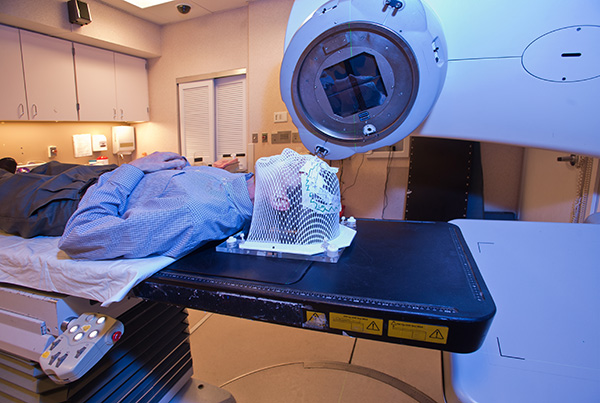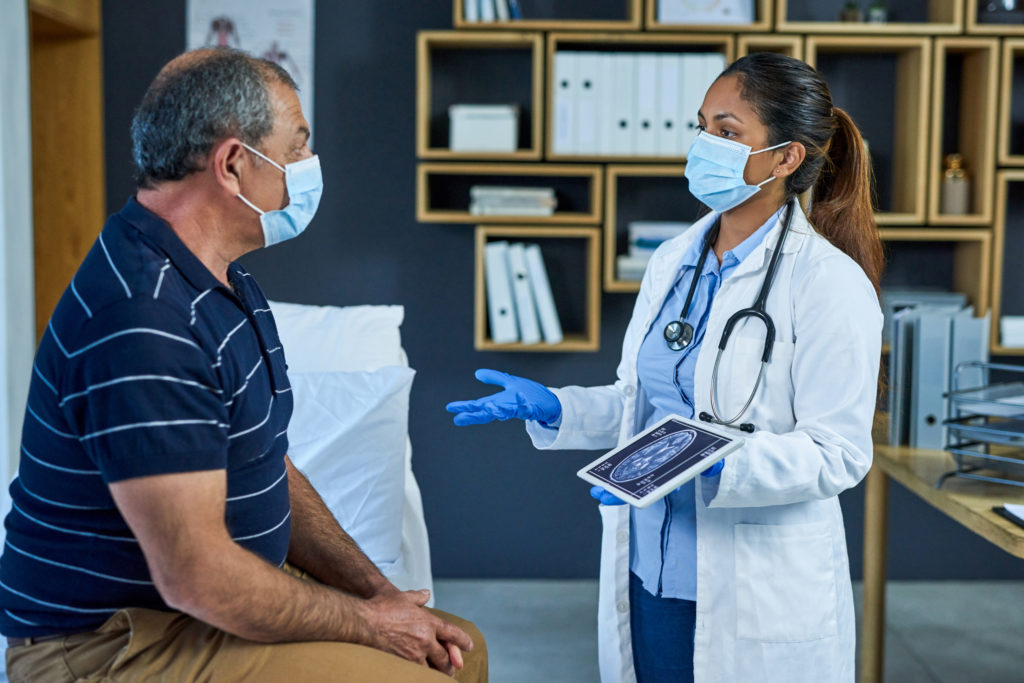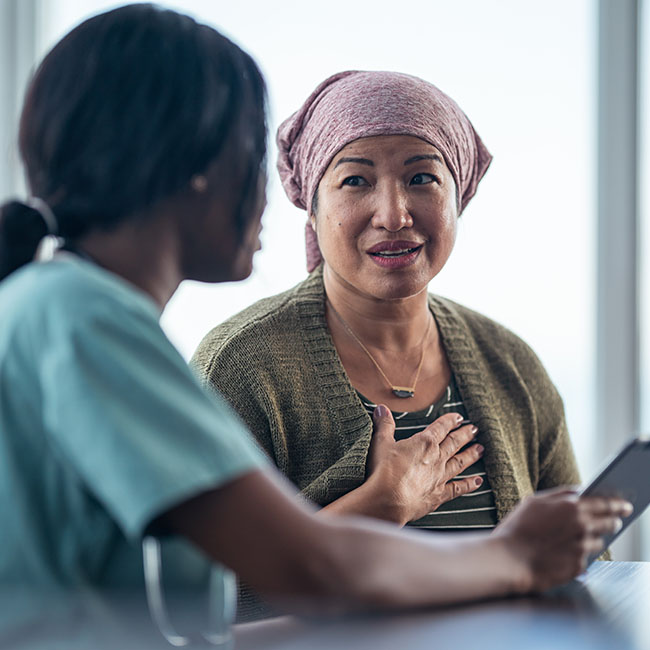Radiation therapy is an important part of treatment for many patients with brain tumors, but it can also bring a range of side effects. Fatigue, skin irritation, and hair loss are among the most common. These challenges may appear within days of starting treatment or not until weeks later, sometimes even after treatment ends.
“My neuro-oncologist mentioned this would be the time in my care plan where I felt like a cancer patient the most due to having to be at the clinic every weekday morning for eight weeks,” said Tommy M., who has astrocytoma. “She said to expect hair loss, headaches, and fatigue during this 8-week period.”
To help others feel more prepared, patients who have been through brain tumor radiation therapy share their tips for managing side effects.
The content in this blog post is for informational and educational purposes only. It does not constitute medical advice. Please speak with your health care team to discuss your particular circumstances before making any decisions.
1. Speak Up About Your Side Effects
“Keep your radiation team up-to-date with your symptoms,” said Anne K., who has glioblastoma. “I have learned that this is not complaining — it is informing.”
Erin G., who went through radiation therapy for oligodendroglioma, added, “Speak up! If you are experiencing a side effect, there are things they can prescribe to help you cope with it. Don’t just deal with being uncomfortable if you don’t have to.”
Will R. experienced nausea as a result of his radiation treatment following a grade 3 anaplastic astrocytoma diagnosis, and his radiation oncologist prescribed anti-nausea medication to help him through it.
“Think of radiation therapy like a marathon, not a sprint,” Will said. “No awards are given to patients who opt for fewer medications to manage symptoms and side effects. Take what helps you feel good. There’s not an ounce of shame in prioritizing comfort.”
2. Eat Even When You’re Not Hungry
Radiation therapy can affect your appetite and change the way foods taste, but maintaining a balanced diet is crucial for keeping your energy up and supporting your body throughout treatment.
Lisa G., who has infiltrative astrocytoma glioma, shares, “It was suggested by the team dietitian that I eat mini meals during the day to maintain energy. I did have some additional weight loss, and when it went below the 5% safe mark, I had to be more closely monitored. Foods began to taste different, which made eating more difficult.”
Small, frequent meals and snacks, especially those high in calories and protein, can help you stay nourished even when your appetite is low. Your care team can provide strategies and guidance if you’re struggling to eat enough.
3. Stay Hydrated
Staying hydrated can help reduce the severity of side effects and lower the risk of missed or delayed treatments. MD Anderson recommends 8-12 cups of water per day for the average patient undergoing radiation therapy.
Limit excessive caffeine, which can worsen dry mouth. The American Institute for Cancer Research encourages eating foods with high water content, such as fruits, vegetables, soups, yogurt, smoothies, and applesauce.
“I made sure to stay consistently hydrated every day of treatment to try and maintain some energy levels,” Tommy said. “I tried to focus on what I could control throughout the process and not dwell on what I couldn’t.”
4. Manage Hair Loss With Comfort and Creativity
Hair loss is a common side effect of brain tumor radiation therapy, and it can happen at any point during treatment or even after radiation therapy ends. Experiencing hair loss can be emotionally challenging. Patients have found ways to cope, protect their scalp, and even have a little fun with their new look.
“My hair began thinning and falling out around four weeks,” said Tori K., who has glioblastoma. “Have some fun with your hair before the inevitable shave — I dyed mine blue!”
Some patients may want to purchase a hair covering, such as a wig or scarf.
“Be prepared to lose your hair,” said Julie K., whose son had glioblastoma. “Buy yourself a few wigs if you’re a woman, or make sure you have stocking caps specific for radiation patients, as they will keep your head warm when you sleep. My son wore a baseball cap during the day, which helped to prevent sunburn.”
In addition to using gentle fabrics like silk, cotton, and bamboo, the American Cancer Society recommends using mild or baby shampoo to wash your hair during radiation therapy.
“I got a lot of silk and satin hair ties, the silk squares, all of which were easier on my hair,” said Melanie F., who has diffuse astrocytoma. “I also limited washing my hair to one to two times per week to minimize hair loss.”
5. Talk to Someone
Radiation therapy can take a toll not just on your body, but on your emotions and mental well-being. Talking to someone — a friend, therapist, or support group — can help you process your feelings and navigate the challenges of treatment.
“Get a good therapist,” suggested Rebecca Z., who went through radiation treatment multiple times for ependymoma. “The physical symptoms of cancer and radiation treatment are one thing, but the mental strain that it puts on you is an entirely different thing.”
All feelings are valid as you go through radiation treatment, and a therapist can help you work through the emotions you are experiencing.
“I utilize talk therapy,” said Katrina S., who has astrocytoma. “It’s still difficult to accept that I cannot operate the same way I did prior to treatment. Therapy helps me to work through the frustration of lingering side effects and helps navigate life in a way that works for me. For someone starting radiation, I think I would tell them any emotion they are feeling is valid.”
6. Protect Your Skin
Skin irritation is another common side effect of radiation therapy, often appearing within the first 2–3 weeks of treatment. It may look or feel like a sunburn — red, discolored, itchy, peeling, or even blistered. In fact, your skin is more sensitive to the sun, so cover up when heading outside.
Joerg H., who has glioblastoma, said, “I started using skin care products early on and protected my head from direct sun exposure, which I believe made a large difference.”
Before applying any creams, ointments, or other products, consult your radiation therapist or oncologist. Some products can interfere with treatment, so it’s important to use only those recommended by your team.
In her book Let’s Talk Radiation Therapy, radiation therapist Margeaux Gregory writes, “Aquaphor is a great product. It’s the most widely accepted skin treatment for radiation that I have seen patients have success with across the board. It’s great for helping with dry or tight skin and is a great lotion to start with, right from the beginning of treatment. Make sure, though, not to use the spray version, as the aerosols can be irritating to irradiated skin.”
7. Prioritize Rest
Both physical fatigue and cognitive fatigue are common during radiation treatment. The high-energy beam can affect healthy cells near the tumor, and as your body works to repair them, fatigue can set in.
It might seem counterintuitive, but gentle movement can help maintain your energy. “Stay physically active as much as possible to keep your energy levels strong,” said Andy H., who has glioblastoma. “Allow adequate rest and sleep as needed.”
Plan your day around your energy levels. Schedule important tasks or appointments when you have the most energy — usually earlier in the day — and save low-energy tasks for later.
“I have had to learn to listen to my body and brain,” Katrina said. “When I am feeling tired, physically or cognitively, I prioritize rest and keep social activities to a minimum.”
Short naps of 10-25 minutes can also help you manage energy. As Eric W. said after going through radiation treatment for grade 2 astrocytoma, “Listen to your body. If you need to rest, rest.”
8. Be Patient With Yourself
Radiation therapy can take a physical and emotional toll that often lasts well beyond the final treatment session. Give yourself permission to move at your own pace and recognize that recovery is a gradual process.
“Energy drops so much with your mind and body needing to rest and sleep,” said Monica R., who received radiation therapy for a brain tumor. “The fatigue lasts long after treatment ends, so be patient with yourself.”
These tips from patients who have undergone treatment highlight that small, practical strategies and self-compassion can help you navigate your brain tumor radiation therapy with more comfort and control.








